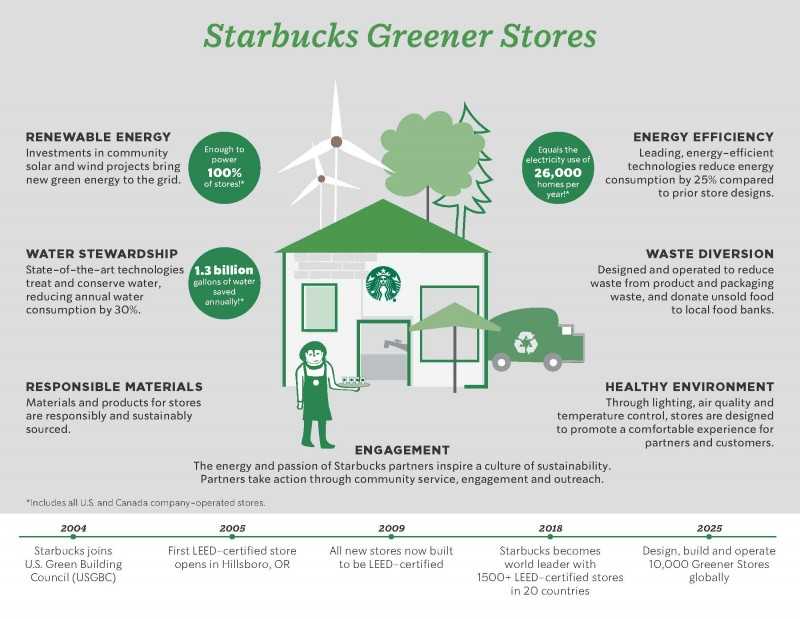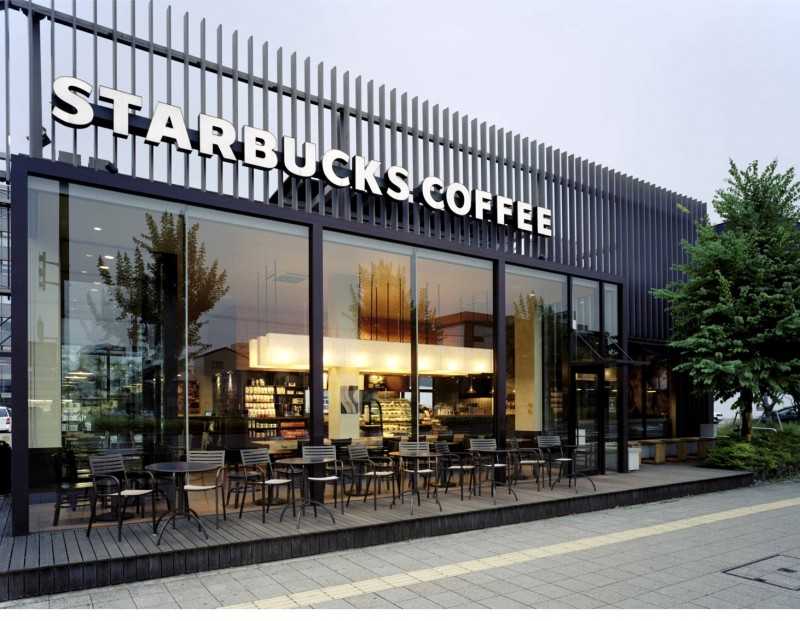SAN FRANCISCO, U.S. — Starbucks Coffee Company has announced on September 13, the “Starbucks Greener Stores” framework and a commitment to design, build and operate 10,000 “Greener Stores” globally by 2025.
“Starbucks Greener Stores” framework will be built upon comprehensive performance criteria that help ensure the company’s approach to designing, building, and operating its company-owned stores sets a new standard for green retail. Over the next year, Starbucks will develop an accredited program to audit all existing company-operated stores in the U.S. and Canada against the framework criteria, culminating in 10,000 “Greener Stores” globally by 2025, encompassing existing stores, new builds and renovations.
“Starbucks Greener Stores” framework will also be open-sourced to benefit the broader retail industry.
“Simply put, sustainable coffee, served sustainably is our aspiration,” said Kevin Johnson, president and ceo of Starbucks. “We know that designing and building green stores is not only responsible, it is cost effective as well. The energy and passion of our green apron partners has inspired us to find ways to operate a greener store that will generate even greater cost savings while reducing impact.”
Announced on-stage at The Global Climate Action Summit in San Francisco, C.A., the “Starbucks Greener Stores” framework is anticipated to save the company an incremental $50 million in utilities over the next 10 years. This builds on Starbucks ten-year legacy of utility cost savings attributable to Greener Store practices, which already equates to approximately $30 million in saved annual operating costs.
With this commitment, Starbucks will also further enable and empower its more than 330,000 partners globally to be informed and engaged in sustainability, adding to a burgeoning group of partner advocates through Partners for Sustainability and the Greener Apron voluntary certification program with Arizona State University.
“Starbucks Greener Stores” framework will be co-developed by leading experts including World Wildlife Fund (WWF) and will be audited and verified by SCS Global Services, a third-party verification organization that also oversees Starbucks Coffee and Farmer Equity (C.A.F.E.) Practices. This framework will be open-sourced to enable other retailers to engage in this initiative.
“This framework represents the next step in how Starbucks is approaching environmental stewardship, looking holistically at stores and their role in helping to ensure the future health of our natural resources,” said Erin Simon, Director of R&D at World Wildlife Fund, U.S. “When companies step up and demonstrate leadership, other businesses often follow with commitments of their own, driving further positive impacts.”
“Willingness for Starbucks to independently verify a large-scale complex deployment of a robust, impact driven and an innovative multi-attribute Greener Stores program to address climate change, demonstrates leadership, integrity and transparency, which are core values shared by SCS,” said Stanley Mathuram, Vice President at SCS Global Services.
Starbucks has been committed for more than a decade to the development and implementation of scalable green building and operations. In 2001, Starbucks joined with the U.S. Green Building Council® (USGBC) to develop the LEED® for Retail program, and in 2005, Starbucks opened its first LEED®-certified store. Today, Starbucks operates more than 1,500 LEED®-certified stores globally across 20 countries – including all 50 states and Puerto Rico – more than any other retailer in the world.
Starbucks investment in a sustainable future continues with the announcement of a green building framework that exceeds construction and design to address long-term, eco-conscious operation. Built on a foundation of the LEED certification program and sustainable operations, the “Starbucks Greener Stores” framework will offer a comprehensive model and broad environmental scope that is universal in design, but most relevant to the retail industry. With performance-based standards that incorporate design and extend throughout the life of a store, “Starbucks Greener Stores” will focus on:
- Energy Efficiency & Water Stewardship: Deploying technologies and practices that ultimately deliver 30 percent water savings and 25 percent energy savings compared to previous store design standards.
- Renewable Energy: Sourcing renewable energy equivalent to 100% of the electricity used in our U.S. and Canada stores.
- Healthy Environment: Designing and operating stores to create a comfortable experience for partners and customers, including lighting, air quality and temperature.
- Responsible Materials: Ensuring materials and products for stores are responsibly and sustainably sourced.
- Waste Diversion: Designing and operating stores to reduce waste.
- Engagement: Inspiring a culture of sustainability and empowering partners to take action, be informed, and engage in sustainability issues and practices.
 The announcement builds on Starbucks 30-year track record of focusing on sustainability across all aspects of its business, including:
The announcement builds on Starbucks 30-year track record of focusing on sustainability across all aspects of its business, including:
- Achieving 99 percent ethically-sourced coffee (More here)
- Innovating to reduce single-use plastic straws globally by 2020 (More here)
- Pledging $10 million to develop and help bring to market, a fully recyclable and compostable hot cup (More here)
- Establishing a 5p paper cup charge across all 950 stores in Britain to promote reusability (More here)
- Offering a discount to any customer who brings a reusable cup or tumbler to company-owned stores around the world
- Reducing packaging waste by offering cups containing 10% post-consumer fiber
- Launching the Sustainable Coffee Challenge in partnership with Conservation International at the U.N. climate negotiations in Paris (More here)
- Introducing the first U.S. Corporate Sustainability Bond to support Starbucks coffee supply chain (More here)
- Purchasing renewable energy, currently covering more than 60% of our electricity usage globally, and 100% of Starbucks company-operated stores in the U.S. & Canada (More here)
- Reducing water usage by 30% between 2008 and 2017 in company-operated stores
- Addressing food waste by donating eligible, unsold food nightly – 10 million meals to date – to local community food banks via Starbucks® FoodShare.










